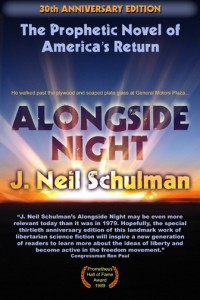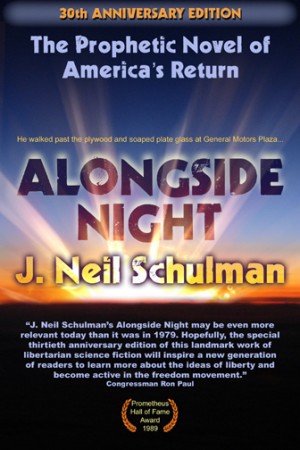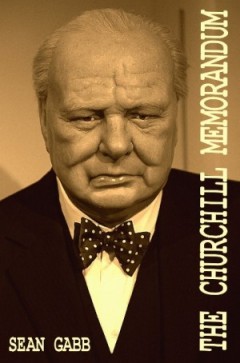

Alongside Night by J. Neil Schulman, so far as I am aware, is still the agorist novel par excellence. More than three decades have passed since its publication — not that you would know it without looking at the copyright date — yet in that time no other novel has so successfully mixed the principles of agorism with such a keen perspective on the future. There are not many novels that can top it for entertainment value either.
The story takes place in what was then the future, but which now seems a very prescient present. Not only is the story filled with theretofore unrealized gadgets and technology that differ from what we actually possess sometimes by no more than an appellation, or occasionally a small feature or manner of use, but the economic conditions described in the tale read like a seer’s forecast.
Schulman’s knowledge of economics allowed him to make a forecast every bit as accurate as the one for which Ayn Rand, in her novel Atlas Shrugged, has been lauded of late. In fact, this very knowledge of economics is probably what helped the author predict all those gadgets, for it is well established that science-fiction authors, a group not known for their economic acumen, tend to think on a grand scale when most of the advances, in a consumer-driven society, are modest devices of everyday convenience and entertainment.
It is a dystopian world we are plunged into in Alongside Night, where central control of the economy and erosion of civil liberties proceed, as they must, hand in hand. When the government abducts the protagonist’s father, a noted free-market libertarian economist somewhere between Milton Friedman and Ludwig von Mises in his radicalness, the high school student Elliot Vreeland embarks on a quest to free him. This quest takes him into the world of the agorists, free-market rebels and masters of counter-economics.
[continue reading…]
Help Promote Prometheus Unbound by Sharing this Post


Before I studied Austrian Economics and profited from the clarity it brings to phenomena that otherwise seem chaotic and unfathomable, I read an article by Dave Barry that made me laugh. In it, he parodied the stock market, saying something to the effect of, “The DOW Jones plunged today when scientists discovered that Saturn had seven moons, and not six as previously thought.” That sentence encapsulated the mystifying and capricious vicissitudes of an economy I did not understand, much like airports stupefied the Cargo Cults. After watching In Time, it is obvious to me that writer/director/producer Andrew Niccol is mired in the same blithering ignorance that Mises and Rothbard pulled me out of.
Justin Timberlake plays Will Salas, a blue-collar man living day-to-day in a world where no one ages past 25 and time is the economy’s currency. The time you have left is measured on your forearm, and you can give and receive it either by placing your wrist over a scanner, for machine/human interactions, or gripping forearms with someone, for person-to-person transactions. The world is divided into time zones and people live in the one that pertains to their occupation and income level. As long as you have time on your forearm, you can live forever, but if you go broke, you die.
One night Will Salas saves a rich man who has wandered into Dayton, the poor time zone where Salas lives, from being robbed by so-called Minutemen, petty gangsters who steal people’s time. This man, Henry Hamilton, is 105 years old and weary of being alive. He bequeaths his century of time to Will and “times out,” but due to a surveillance camera that catches only part of the action, it looks to later observers that Will has murdered Henry. Meanwhile, on the very day her son becomes a rich man, Rachel Salas (Olivia Wilde) is caught in the middle of nowhere at night with, after making a loan payment, only ninety minutes left to live. The bus fare back home has been increased to two hours and the driver will not allow her on the bus without paying the full fare up front. None of the other passengers step forward to give her a small loan, so she is left to die. A grieving Will swears revenge on the system that killed his mother.
[continue reading…]
Help Promote Prometheus Unbound by Sharing this Post

I recently read The Churchill Memorandum, by English libertarian Sean Gabb. I devoured most of it on a transatlantic flight, and finished the last bit on terra firma. I tend to like thrillers (some favorite authors include Nelson DeMille and, of late, Cherie Priest, author of Bloodshot); alternate history (e.g., Harry Turtledove, Brad Linaweaver’s Moon of Ice, L. Neil Smith’s The Probability Broach); and books with libertarian themes or influences (L. Neil Smith, Ayn Rand, Henry Hazlitt, Brad Linaweaver, Victor Koman, J. Neil Schulman). So it’s no surprise I enjoyed The Churchill Memorandum, which is very well written and which combines all three features (full disclosure: Gabb is a friend).
The novel is set in 1959, in an alternate history in which Hitler died in a car accident in 1939, thus averting WWII and changing the course of history. Gabb’s libertarian influences — he’s the head of the UK Libertarian Alliance — as well as his deep historical knowledge, are evident throughout the book. The novel depicts amazing technological progress — some of it rivaling or exceeding 2011 levels — in 1959, since WWII did not occur to sap away the economic strength and entrepreneurial innovations of tens of millions of individuals who would otherwise have been eviscerated in state war. So in 1959 there are magnetic bullet trains, home energy generators, and many other seemingly fantastic innovations.
The story follows the adventures of one Anthony Markham, a Churchill historian who, on a trip to the now-fascist police-state and isolationist America to research the Churchill archives at Harvard, stumbles across an explosive document that purports to document secret pacts that changed the course of American and world history. This leads to an intriguing geopolitical thriller informed by the author’s libertarian views. It is told in first person point of view (POV), my personal favorite for thrillers (and other novels) since it forces the narrator to show not tell, and not to omnisciently cheat and reveal details the protagonist would not know. Gabb’s ambivalent and somewhat bipolar English attitude towards America — at once a great power and friend of England, and a schizophrenic and dangerous destroyer of the ancient European order and institutions — is present throughout; and as a skeptic of the American mythos myself, I really enjoyed this foreign perspective. (Gabb recently presented a talk on “The Case Against the American War of Independence.”)
[continue reading…]
Help Promote Prometheus Unbound by Sharing this Post
A few years ago in honor of Arthur C. Clarke’s then-recent birthday, I wrote on my own blog that he must never have read Ludwig von Mises and Murray Rothbard,
because according to this quote cited by Gregory Benford in his happy-birthday letter in Locus Magazine (January 2008), he claims that “there are some general laws governing scientific extrapolation, as there are not (pace Marx) in the case of politics and economics.” Well, far be it from me to disagree that Marx was wrong about a lot of things, but Clarke is wrong here. Sir Clarke, you may be 90 years old now, and happy birthday by the way, but it’s never too late to acquire a firm grasp of sound economic theory.
As disappointing as it is, it’s not surprising that he had a natural-scientistic bias against economics. Sadly, he died only a few months after my post.
In a more recent article in the Sri Lanka Guardian, more of Clarke’s economic ignorance is on display:
While researching for this article I came across a searing indictment by Clarke on the American capitalist system. After observing that the structure of American society may be unfitted for the effort that the conquest of space demands he continued, “No nation can afford to divert its ablest men into essentially non-creative and occasionally parasitic occupations such as law, insurance and banking”. He also referred to a photograph in Life Magazine showing 7,000 engineers massed behind a new model car they had produced as ‘a horrifying social document’. He was appalled by the squandering of technical manpower it represented. All this indeed makes one wonder whether he really was a closet socialist.
[continue reading…]
Help Promote Prometheus Unbound by Sharing this Post













